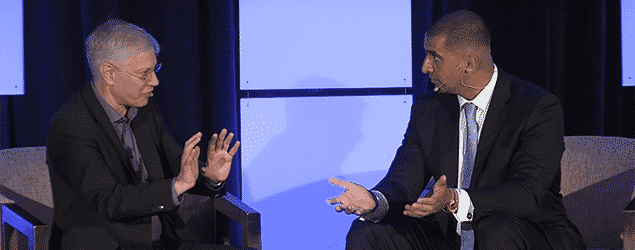Anniversary Chapters: Tara Smith Discusses “No Tributes to Caesar: Good or Evil in Atlas Shrugged”

To celebrate the 60th publication anniversary of Ayn Rand’s Atlas Shrugged, we’re talking to the authors of chapters in Robert Mayhew’s book Essays on Ayn Rand’s “Atlas Shrugged.” Next up is Tara Smith, whose chapter “No Tributes to Caesar: Good or Evil in Atlas Shrugged” examines how the choice between good and evil is presented in Rand’s magnum opus, which was published in 1957.
“I wanted to tackle some natural questions that a lot of readers have, when first confronting the ‘extremes’ of Atlas, its apparent harshness in certain respects,” Smith said. “I had had some of these questions myself, back when I read the book for the first time. So I thought it could be useful to address very directly the thinking behind the stark alternatives that Rand presents. Understanding them in terms faced by the characters in the midst of the action of the novel, I think, can also help us — it certainly helped me — to better understand the wider, more abstract point about the fundamentally either-or character of our choices.”
The chapter is a tour de force, moving from the source of morality’s authority to the steps by which characters in Atlas come to understand (or evade) that authority, to the ways in which the characters’ knowledge shapes their actions, to the absolutism of Rand’s Objectivist morality. (Note: spoilers follow.)
In the process, Smith shows how the “either-or” nature of morality helps explain some of the book’s terminology (such as the many references to “destroyers,” “looters,” and “enemies”) and various plot points, including Hank Rearden’s decision to divorce his wife without any alimony or property settlement, John Galt’s refusal to allow Dagny Taggart to communicate with Rearden from the Valley, Dagny’s decision to shoot and kill an armed guard, and the strikers’ decision to leave many decent people behind as society collapsed.
Here’s a summary paragraph from near the end of the chapter:
Man cannot fudge the law of identity and the law of excluded middle. Life or death is either-or. The pursuit of one’s life must be, correspondingly, uncompromising. Remember that the heroes come to realize that their opponents stand on the premise of death. Jim, Lillian, and Stadler are not misguided allies of theirs who are after the same thing. If they were, the heroes might reasonably think, “oh, they’ll come around, eventually; they will appreciate that ours is the better way.” The ugly fact is that the looters do not seek what the producers do. Accordingly, all that the looters are doing and can be expected to do in the future is obstruct the producers’ lives. The only thing for those who love their lives to do, consequently, is to withdraw the sustenance they have provided to their destroyers and renounce the burdens they have borne on their enemies’ behalf. The heroes’ deliverance depends on their total rejection of all irrational standards. Their full commitment to their own happiness depends on their recognition that anything less than that is suicide.
Tara Smith, a professor of philosophy at the University of Texas – Austin, is the BB&T Chair for the Study of Objectivism and holds the Anthem Foundation Fellowship. She is also a member of the board of directors of the Ayn Rand Institute and the author of Ayn Rand’s Normative Ethics: The Virtuous Egoist, among other books.
If you find these perspectives intriguing, Essays on Ayn Rand’s “Atlas Shrugged” is available here, and more on Atlas Shrugged is available here.
And stay tuned for Smith’s discussion of the other chapter she contributed to the Mayhew collection, “‘Humanity’s Darkest Evil’: The Lethal Destructiveness of Non-Objective Law.”



